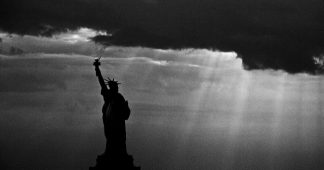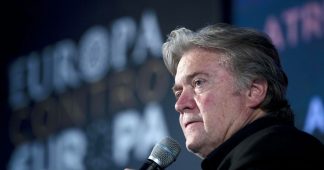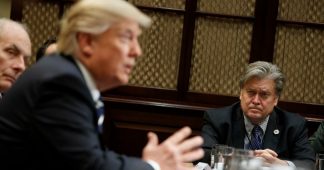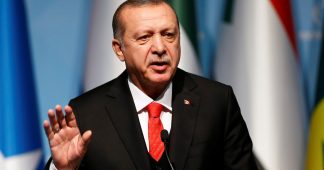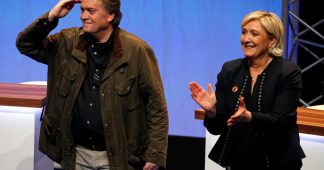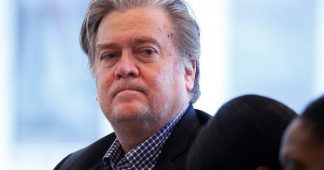What does Donald Trump stand for?
It’s hard to tell. His inflammatory calls during the campaign to build a wall at the Mexican border and ban Muslims from entering the country were balanced by seemingly moderate positions on gay rights and health care. On trade and infrastructure, he can sound a little like a Democratic populist. Some of Trump’s voters see him as a pragmatist who would govern like a businessman (whatever that means).
Now that Trump is president-elect, pending the Electoral College vote on December 19, the question has taken on monumental importance. Trump’s Cabinet secretaries are emerging slowly. But we do know something about the people shaping the transition. Two of Trump’s close advisers have known views on some big-picture issues about the world, and if you read them, there’s a troubling commonality that goes far beyond any specific policy areas: They are our first clear view of Trumpism as an illiberal theory of politics with deep doubts about democracy.
The advisers are Steve Bannon, the right-wing media provocateur who ran Breitbart News, then Trump’s campaign, and has now been named to the influential post of “chief strategist,” a role in which he is expected to have the new president’s ear in the White House. The other is Peter Thiel, the Silicon Valley libertarian who spoke at Trump’s convention, gave more than $1 million in support of his campaign and is now a member of Trump’s transition team. Although Thiel says he doesn’t intend to have a full-time position in Trump’s administration, he reportedly has been feeding the president-elect ideas from a Silicon Valley “brain trust,” and a principal at Thiel’s venture capital fund has been named to Trump’s defense transition team. The speeches and writings of these two political outsiders suggest that beyond policy, there’s something much deeper at work: an impulse to reshape the country, and the world, in a way that would change the meaning of democracy in unsettling ways—and, maybe, ultimately undermine it.
To understand Bannon’s outlook, the best source we have is a remote address he gave in 2014 to a conference of the Human Dignity Institute, a conservative political group with right-wing Catholic ties, which was being held at the Vatican. In the talk, recently published by BuzzFeed, Bannon laid out a strikingly coherent picture of his worldview, which has a few fundamental elements.
First, the United States and Europe are at the beginning of “a very brutal and bloody conflict” against “a new barbarity that’s starting, which will completely eradicate everything that we’ve been bequeathed over the last 2,000, 2,500 years,” unless “we” defeat it. This is “jihadist Islamic fascism.” The “river of blood” that the Islamic State promises “is going to come to Western Europe, it’s going to come to the United Kingdom.” (Bannon seems to be just the leading edge of this clash-of-civilizations theme in the Trump administration. National Security Adviser Michael Flynn has called radical Islam an “existential threat” and suggested that Islam itself is “a cancer” of an ideology rather than a genuine religion.)
Second, what “we” must defend against Islamic fascism is a very specific version of Western civilization. The lesson of World War II and the struggle against totalitarianism, Bannon explains, is that the great and singular achievement of the West is “an enlightened form of capitalism.” It is, he says, a specifically “Christian” or “Judeo-Christian” version of capitalism that produces wealth for the good of the community, in which “divine providence” empowers its favored people “to actually be a creator of jobs and a creator of wealth.” The thing to notice is what is left out. In a description of a coming battle for Western civilization and of the lessons of the 20th-century struggle against totalitarianism, Bannon does not mention democracy. He doesn’t mention constitutionalism. Capitalism is the thing at stake in a global clash of civilizations, the most precious part of a legacy of freedom.
Bannon believes that the political force rising to defend all these values today is “a global tea party” that links Trump, Brexit voters, the anti-immigrant and anti-Islamic National Front in France, and Narendra Modi’s nationalist government in India. These groups, Bannon says, may be incidentally racist or attract some racist elements, but those elements will “get washed out” and leave their pure and proper value, which is the nationalist defense of enlightened capitalism. They are the ground troops of the coming struggle, rebuilding a West that can defend itself and is worth defending.
Like the center-left journalist John Judis, who published The Populist Explosion earlier this year, Bannon sees these new nationalist movements as reactions, above all, against free-market globalization, with its disruption, weakening of the traditional working and middle classes, and hollowing-out of traditional industries. Like some tea party activists and Breitbart contributors, he also sees the global tea party as an attack on the national elites in each of the movements’ home countries, whose privileges Bannon is happy to denounce as crony capitalism.
This is a coherent picture of the global wave of right-wing populism as key to Trump’s electoral success. The Trump movement is nationalist but also internationalist: It treats the middle-class nationalist movements around the world as the proper units to express a global middle-class revolt. It is, frankly, hard to parse the difference between Bannon’s “enlightened capitalism,” crown jewel of the West, and the globalizing and crony versions that he sees his middle-class armies destroying. (To wit, Bannon and many of Trump’s Cabinet picks so far have Ivy League degrees and Goldman Sachs posts on their résumés.) But the political logic is clear: Bannon positions himself against capitalism as it is, in favor of capitalism as it ought to be.
What does it mean that Bannon doesn’t talk about democracy or constitutionalism? Maybe he just forgot. But it seems more likely that his nationalist capitalism is an alternative theory of political legitimacy, and one whose emergence doesn’t necessarily depend on the machinery of democracy. The role of politics in Bannon’s view seems to be not to choose the direction of national and global economics, but to move them toward a destination already in Bannon’s mind. When Bannon famously called himself a “Leninist,” he might have had this idea in mind: that the role of political action is to seize the state and move ruthlessly toward a predetermined goal, marshaling whatever forces will help you get there. Bannon gives no hint that the populist wave is a call for deepened democracy, which would mean, for instance, expanding political participation for working people and the marginalized (rather than embracing an anti-union agenda and vote-suppression laws) and reducing the political influence of the superwealthy class that produced Trump and is now beginning to fill his Cabinet and the ranks of his advisers.
The whitewashing of anti-immigrant sentiment is also telling. A national capitalism, after all, makes judgments about who is in and who is out, and the global populist wave has generated a great deal of political energy around casting out the allegedly undeserving. In What Is Populism?, his recent book about ascendant nationalist movements, political scientist Jan-Werner Muller defines populists as politicians who claim that some part of the political community—a racial group such as white people, a linguistic group like English or French speakers, or, maybe, a social group like “hard-working Americans” —is the real, true nation. Other people may be here, they may have the theoretical right to speak or vote, but when push comes to shove, they do not really count.
This exclusionary approach came to life in Trump’s candidacy. As Trump himself said in a May rally, “The important thing is the unification of the people, and all the other people don’t matter.” In his late-campaign intimations that he might not concede the election if Hillary Clinton won, Trump seemed to suggest that if his supporters were the “real Americans,” then in principle they could never lose, even if “the other people” happened to outvote them. Again, Bannon doesn’t seem to be the only Trump insider with these attitudes. Jeff Sessions, whom Trump has nominated for attorney general, allegedly called the NAACP and the Southern Christian Leadership Council “un-American,” which is about as clear a statement as you could find that certain kinds of dissenters are not really part of the political community.
Just this week, Trump tweeted that people who burn the American flag should be stripped of their citizenship. Everyone from Clinton to George H.W. Bush has attacked flag burning, which is a constitutionally protected action, but Trump stood out for suggesting we expel flag-burners from the national community. That, too, comports with Bannon’s worldview, in which those who pledge allegiance to the state—in their speech and actions—are economically and politically privileged. The state, in the American tradition, is not the same thing as the country or the Constitution, which is why James Madison insisted, “the censorial power is in the people over the government, not in the government over the people.” In Trump’s America, there are warning signs that the government may be glad to censor and condemn “the other people.”
Thiel is quite a different figure from Bannon, but his ambivalence about democracy is even more explicit, shading over into outright contempt. A Silicon Valley libertarian who got rich by developing PayPal, Thiel historically likes his capitalism undiluted by sentimentality. He shares Bannon’s disdain for complacent elites and their crony capitalism, and has been an attention-getting provocateur against establishment institutions such as his alma mater, Stanford University. (He has famously offered grants to talented students who forgo college.) He is interested in technology that overcomes familiar human limitations, including space colonization and medical research into immortality. This kind of technological utopianism has a long pedigree in Silicon Valley, and was already well established in the 1990s, when it got friendly treatment from buzzy venues like Wired.
Thiel drew a lot of attention—and indignation—during the campaign, when he went against the culturally liberal and cosmopolitan tendencies of tech culture to endorse Trump and accept a speaking role at the GOP convention. What he said there fit a familiar mold of business-oriented national-greatness conservatism, with strong overtones of Ayn Rand libertarianism. The reason the economy was not serving most people was “incompetent” regulation by people like Clinton and Barack Obama. “Stupid wars” and outmoded bureaucracy had undermined the military. The country needed to be run like a business again—specifically, like a tech business. Thiel didn’t say how this would work, exactly—it was a pretty conventional speech—but he implied it would mean a return to the age of space exploration and other great national ventures. It was, basically, Trump’s stump speech with a technophilic Silicon Valley twist.
Thiel’s recasting himself as Tech Trump was perhaps most striking because, just a few years ago, he had written off politics altogether. “I no longer think that freedom and democracy are compatible,” Thiel wrote in a 2009 Cato Institute essay. Instead, “the great task for libertarians is to find an escape from politics in all its forms.” He proposed redirecting energy to private enterprises that could end-run both the right’s “totalitarian and fundamentalist catastrophes” and the left’s “unthinking demos that guides so-called ‘social democracy.’” He proposed cyberspace, outer space and the high seas as refuges for anti-political libertarians. In a follow-up essay, Thiel explained, “I believe that politics is way too intense. That’s why I’m a libertarian. Politics gets people angry, destroys relationships and polarizes peoples’ vision: the world is us versus them; good people versus the other. Politics is about interfering with other people’s lives without their consent. That’s probably why, in the past, libertarians have made little progress in the political sphere. Thus, I advocate focusing energy elsewhere, onto peaceful projects that some consider utopian.”
So how did Thiel become a supporter and adviser for Trump, whose campaign has been as angering and polarizing as any in memory? There are plenty of theories about Thiel’s motives, ranging from rational self-interest—in crony capitalism, the rational investor will angle to be a crony—to contrarianism: Thiel likes to shock, and he has gotten plenty of attention for endorsing Trump. Trump also has the great Silicon Valley virtue of being a disrupter, and Thiel argues that “the system” really is broken. He says that it is a very bad thing that most Americans have not participated in the economic growth of the past few decades, that globalization has served them poorly, and that a broken political system and corrupt establishment cannot help them. Trump might tear these institutions down, opening up paths to reform.
Whatever Thiel’s motive, there is no sign that it is a new enthusiasm for democracy. Thiel wrote in his 2009 essay that “the broader education of the body politic has become a fool’s errand.” There is no evidence that he has changed his mind about that. Trump’s campaign, as noted, confirms Thiel’s dire 2009 description of politics as an us-versus-them, anger-stoking festival of irrationality. But rather than renounce politics, Trump is pushing it in a direction that Thiel seems to tolerate, even embrace: If you can’t escape the democratic herd, then maybe you can manage it on its own irrational terms. If politics is essentially demagoguery, then what a libertarian needs is a skillful and congenial demagogue.
That sounds like “managed democracy,” the standard euphemism for Vladimir Putin’s style of governing Russia. Maybe the goal of the managers is to keep the public from getting in the way of people like Thiel. Maybe it’s more affirmative: to give the people heroic leadership and turn the still-massive resources of the American state toward libertarian projects like space exploration and immortality. After all, the modern state is one of the greatest accumulations of capital ever. For a venture capitalist to turn his back on it, as Thiel was ready to do in 2009, is leaving a lot of money (and power) on the table.
Any of these scenarios would be a far cry from the idea that people should actually rule themselves. Thiel, like Bannon, seems to have little confidence in, or commitment to, liberal democracy.
Liberal democracy, with its elections and constitutional limits on government power, is a composite of two ideas. One is that people can and should rule themselves. The other is there should be limits on government’s power to harm individuals or subordinate groups of people. The reasons for the limits are twofold. First, the unique value of each individual, which is also at the root of democracy, means that even though we must be ruled by one another, it must be in a spirit of basic mutual respect. Second, because no part of government—no president, no congressional majority—ever perfectly represents “the people,” all parts of the state need to have some boundaries on what they may do, and some checks on their ability to entrench themselves in power. There are tensions within this worldview, but they are compromises among principles that hold together at a deep level.
Many Americans have taken the strengths and limits of this system for granted in the past few decades. This complacency leads to a pair of mistakes. First is imagining that this system is stable and will endure no matter who is in power. That is naive. Basic principles like free speech and one-person-one-vote are not much more than 50 years old in their modern forms. They replaced more repressive and unequal versions of the American nation: slavery and Jim Crow, as we all know, but also attitudes that are less anathematized today. For instance, there was Teddy Roosevelt’s view that the United States was defined by being an Anglo-Saxon country, linked to allies like England, South Africa and Australia, as well as part of a system of progressive imperialism abroad and moralized, anti-immigrant capitalism at home, locked in a struggle with alien civilizations like Spain (the near enemy, you might say, borrowing a phrase from the jihadists) and China (the far enemy). Nothing in American history more closely resembles Bannon’s view than Roosevelt’s ideology—not the Ku Klux Klan, but our own indigenous predecessor to the French National Front and other right-wing nationalism. Struggle built the system of liberal democracy that many of us take for granted today, and struggle, or failure to struggle, can destroy it.
The second mistake is believing, as many Clinton supporters and commentators seemed to do, that the system has basically succeeded, and that dissenters don’t understand economics (like trade skeptics), expect too much of democracy (reformers like Bernie Sanders and Zephyr Teachout) or are locked in retrograde racism (the so-called deplorables). But populist criticisms of economic inequality and money-soaked democracy are quite valid, and at the moment the future belongs to those who acknowledge them. The question is whether the lessons they draw will press toward inclusion and strengthened democracy, as left-populists like Sanders and Elizabeth Warren do, or toward the new, illiberal, incipiently anti-democratic populism of Trumpism.
Does Trumpism really deserve Trump’s name? Does the president-elect espouse the anti-democratic beliefs that Bannon and Thiel have demonstrated? It doesn’t really matter. What Trump believes is a distraction. Megalomaniacal, appetitive and erratic, he is a demiurge in search of a plan, a would-be king of the world who needs a worldview to fill in the detail. He is a perfect vessel for opportunists whose big ideas can appeal to his sense of grandiosity and mission. This much is clear: Bannon and Thiel believe their ideas have found the perfect host organism. They won’t be the last.
